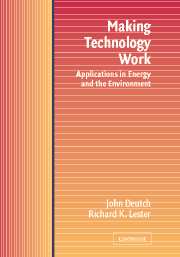Book contents
- Frontmatter
- Contents
- Preface
- 1 Introduction
- 2 Gasohol
- 3 Solar Thermal, Windpower, and Photovoltaic Technologies
- 4 Electricity from Coal
- 5 Controlling Acid Rain from Coal-fired Power Plants
- 6 Greenhouse Gases and Global Warming
- 7 Nuclear Power and Its Fuel Cycle
- 8 Managing Nuclear Waste
- 9 Nuclear Power and Weapons Proliferation
- 10 Natural Gas
- 11 Safety and Risk: Examples from the Liquefied Natural Gas and Nuclear Industries
- 12 Synthetic Fuels
- 13 Fuel Cells For Automobiles
- 14 Energy Models and Statistics
- 15 The Government's Role in Innovation
- 16 Conclusions
- Index
1 - Introduction
Published online by Cambridge University Press: 10 December 2009
- Frontmatter
- Contents
- Preface
- 1 Introduction
- 2 Gasohol
- 3 Solar Thermal, Windpower, and Photovoltaic Technologies
- 4 Electricity from Coal
- 5 Controlling Acid Rain from Coal-fired Power Plants
- 6 Greenhouse Gases and Global Warming
- 7 Nuclear Power and Its Fuel Cycle
- 8 Managing Nuclear Waste
- 9 Nuclear Power and Weapons Proliferation
- 10 Natural Gas
- 11 Safety and Risk: Examples from the Liquefied Natural Gas and Nuclear Industries
- 12 Synthetic Fuels
- 13 Fuel Cells For Automobiles
- 14 Energy Models and Statistics
- 15 The Government's Role in Innovation
- 16 Conclusions
- Index
Summary
Applying new technology in our society is invariably a challenge, and those who try do not always succeed. New technologies are frequently of large scale, involve significant environmental or social consequences and must adhere to a complex framework of governmental rules and regulations whose economic impact may be far-reaching. Issues such as opposition to nuclear power, concern over the environmental effects of burning coal, the ethical dilemmas of stem cell research, and the threats to privacy, intellectual property, and even national security associated with the growing use of the Internet fill the daily newspapers. Learning how to manage the often-competing interests that come into play when new technologies are deployed in society will be increasingly important, especially for scientists and engineers whose professional lives are dedicated to the task of harnessing technology for economic and social ends.
Today the education of scientists and engineers in U.S. universities is still strongly influenced by the conventional view of technological innovation as a linear process. In this view, innovation proceeds through distinct stages: (1) research – the first step of knowledge creation, usually by scientists in a laboratory; (2) development – the step of reducing the knowledge to practice, normally the responsibility of the engineer; and (3) application – the crucial step of implementing a technology, mainly the province of nontechnical professionals, such as managers, financiers, lawyers, politicians, or public-interest advocates. Scientific and engineering education is organized according to this linear perspective.
- Type
- Chapter
- Information
- Making Technology WorkApplications in Energy and the Environment, pp. 1 - 8Publisher: Cambridge University PressPrint publication year: 2003



